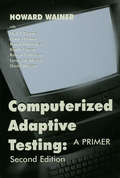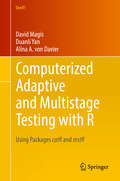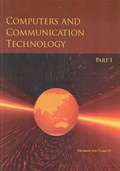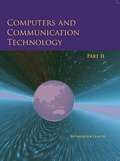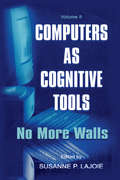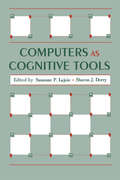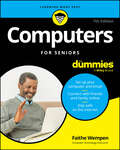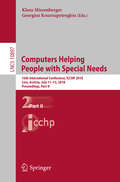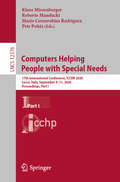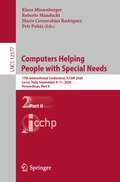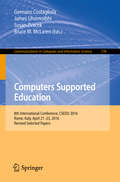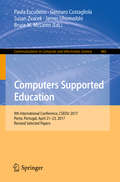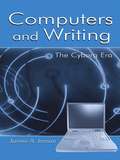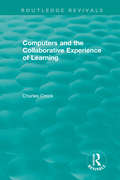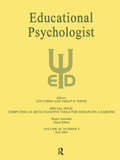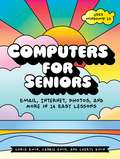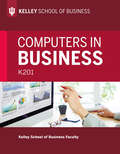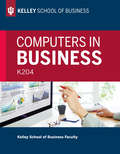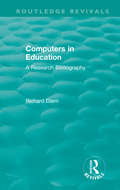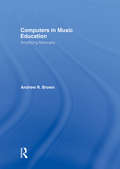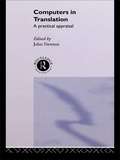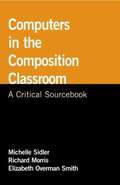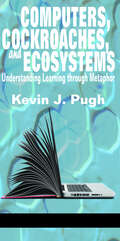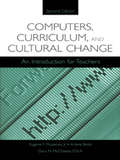- Table View
- List View
Computerized Accounting with QuickBooks® 2020
by Gayle WilliamsThis book gives students an introduction to QuickBooks that focuses not only on the software mechanics, but also on the basic accounting concepts that underlie all accounting systems. This book is not meant to be a user manual. It is meant to teach students how they can work with a computerized accounting system. The students will come away from this book with an understanding that it is knowledge of the principles of accounting, not data-entry skills, that is needed to be successful in business. This book is primarily intended for use in undergraduate accounting programs, although it could be used in business or computer information programs as well. It is expected that students taking this course have already successfully completed a course in financial accounting and have a firm understanding of the principles as well as the mechanics of accounting.
Computerized Adaptive Testing: A Primer
by Howard Wainer Neil J. Dorans Robert J. Mislevy Ronald Flaugher Bert F. GreenThis celebrated primer presents an introduction to all of the key ingredients in understanding computerized adaptive testing technology, test development, statistics, and mental test theory. Based on years of research, this accessible book educates the novice and serves as a compendium of state-of-the-art information for professionals interested in computerized testing in the areas of education, psychology, and other related social sciences. A hypothetical test taken as a prelude to employment is used as a common example throughout to highlight this book's most important features and problems. Changes in the new edition include: *a completely rewritten chapter 2 on the system considerations needed for modern computerized adaptive testing; *a revised chapter 4 to include the latest in methodology surrounding online calibration and in the modeling of testlets; and *a new chapter 10 with helpful information on how test items are really selected, usage patterns, how usage patterns influence the number of new items required, and tools for managing item pools.
Computerized Adaptive and Multistage Testing with R: Using Packages catR and mstR (Use R!)
by Duanli Yan David Magis Alina A. von DavierThe goal of this guide and manual is to provide a practical and brief overview of the theory on computerized adaptive testing (CAT) and multistage testing (MST) and to illustrate the methodologies and applications using R open source language and several data examples. Implementation relies on the R packages catR and mstR that have been already or are being developed by the first author (with the team) and that include some of the newest research algorithms on the topic. The book covers many topics along with the R-code: the basics of R, theoretical overview of CAT and MST, CAT designs, CAT assembly methodologies, CAT simulations, catR package, CAT applications, MST designs, IRT-based MST methodologies, tree-based MST methodologies, mstR package, and MST applications. CAT has been used in many large-scale assessments over recent decades, and MST has become very popular in recent years. R open source language also has become one of the most useful tools for applications in almost all fields, including business and education. Though very useful and popular, R is a difficult language to learn, with a steep learning curve. Given the obvious need for but with the complex implementation of CAT and MST, it is very difficult for users to simulate or implement CAT and MST. Until this manual, there has been no book for users to design and use CAT and MST easily and without expense; i. e. , by using the free R software. All examples and illustrations are generated using predefined scripts in R language, available for free download from the book's website.
Computers & Communication Technology Part 1 class 11 - NCERT
by National Council of Educational Research and TrainingPublished by the NCERT, the book Computers and Communication Technology part 1 for std 11 will help students understand the different basic concepts of computers and the internet. Written in simple english language the book follows the guidelines of the CBSE board.
Computers & Communication Technology Part 2 class 11 - NCERT
by National Council of Educational Research and TrainingPublished by the NCERT, the book Computers and Communication Technology part 2 for std 11 will help students understand the different basic concepts of computers, Java script, coding and the internet. Written in simple english language the book follows the guidelines of the CBSE board.
Computers As Cognitive Tools: Volume II No More Walls (Technology And Education Ser.)
by Susanne P. LajoieSince the publication of the first edition of Computers as Cognitive Tools in 1993, rapid changes have taken place in the uses of technology for educational purposes and in the theories underlying such uses. Changes in perspectives on thinking and learning are guiding the instructional design of computer-based learning environments. Computers as Cognitive Tools, Volume II: No More Walls provides examples of state-of-the-art technology-based research in the field of education and training. These examples are theory-driven and reflect the learning paradigms that are currently in use in cognitive science. The learning theories, which consider the nature of individual learning, as well as how knowledge is constructed in social situations, include information processing, constructivism, and situativity. Contributors to this volume demonstrate some variability in their choice of guiding learning paradigms. This allows readers the opportunity to examine how such paradigms are operationalized and validated. An array of instructional and assessment approaches are described, along with new techniques for automating the design and assessment process. New considerations are offered as possibilities for examining learning in distributed situations. A multitude of subject matter areas are covered, including scientific reasoning and inquiry in biology, physics, medicine, electricity, teacher education, programming, and hypermedia composition in the social sciences and ecology. This volume reconsiders the initial "camp" analogy posited in 1993 edition of Computers as Cognitive Tools, and presents a mechanism for breaking camp to find new summits.
Computers As Cognitive Tools: Volume Ii, No More Walls (Technology and Education Series)
by Sharon J. Derry Susanne P. LajoieHighlighting and illustrating several important and interesting theoretical trends that have emerged in the continuing development of instructional technology, this book's organizational framework is based on the notion of two opposing camps. One evolves out of the intelligent tutoring movement, which employs artificial-intelligence technologies in the service of student modeling and precision diagnosis, and the other emerges from a constructivist/developmental perspective that promotes exploration and social interaction, but tends to reject the methods and goals of the student modelers. While the notion of opposing camps tends to create an artificial rift between groups of researchers, it represents a conceptual distinction that is inherently more interesting and informative than the relatively meaningless divide often drawn between "intelligent" and "unintelligent" instructional systems. An evident trend is that researchers in both "camps" view their computer learning environments as "cognitive tools" that can enhance learning, performance, and understanding. Cognitive tools are objects provided by the instructional environment that allow students to incorporate new auxiliary methods or symbols into their social problem solving which otherwise would be unavailable. A final section of the book represents researchers who are assimilating and accommodating the wisdom and creativity of their neighbors from both camps, perhaps forming the look of technology for the future. When the idea of model tracing in a computer-based environment is combined with appreciation for creative mind-extension cognitive tools and for how a community of learners can facilitate learning, a camp is created where AI technologists and social constructivist learning theorists can feel equally at home.
Computers For Seniors For Dummies
by Faithe WempenBecome a tech-savvy computer user, the beginner-friendly way Computers For Seniors For Dummies gives you the confidence you need to connect with friends and explore the internet all from the comfort of your couch. This step-by-step guide walks you through the basics of buying and setting up a computer, working with Windows or Mac, and getting online. With large print and clear figures, you'll learn essential tasks like emailing, browsing the internet, creating and viewing digital photos, and staying safe from hackers and viruses. In no time you'll be shopping online and video calling family from across the country. Get advice on purchasing a reliable, budget-friendly computer, along with accessories like printers Create formatted documents and spreadsheets and share them with others Organize and share family photos Watch movies and listen to music online Stay safe online, with tips to avoid hackers, scammers, and identity theft Shop online for everything from groceries to life insurance Those older and wiser who need help getting started with computers will love this no-nonsense For Seniors For Dummies guide.
Computers Helping People with Special Needs: 16th International Conference, ICCHP 2018, Linz, Austria, July 11-13, 2018, Proceedings, Part II (Lecture Notes in Computer Science #10897)
by Klaus Miesenberger Georgios KouroupetroglouThe two-volume set LNCS 10896 and 10897 constitutes the refereed proceedings of the 16th International Conference on Computers Helping People with Special Needs, ICCHP 2018, held in Linz, Austria, in July2018.The 101 revised full papers and 78 short papers presented were carefully reviewed and selected from 356 submissions. The papers are organized in the following topical sections: Web accessibility in the connected world; accessibility and usability of mobile platforms for people with disabilities and elderly persons: design, development and engineering; accessible system/information/document design; accessible e-learning - e-learning for accessibility/AT; personalized access to TV, film, theatre, and music; digital games accessibility; accessibility and usability of self-service terminals, technologies and systems; universal learning design; motor and mobility disabilities: AT, HCI, care; empowerment of people with cognitive disabilities using digital technologies; augmented and alternative communication (AAC), supported speech; Art Karshmer lectures in access to mathematics, science and engineering; environmental sensing technologies for visual impairment; 3D printing in the domain of assistive technologies (AT) and do it yourselves (DIY) AT; tactile graphics and models for blind people and recognition of shapes by touch; access to artworks and its mediation by and for visually impaired people; digital navigation for people with visual impairments; low vision and blindness: human computer interaction; future perspectives for ageing well: AAL tools, products, services; mobile healthcare and m-health apps for people with disabilities; and service and information provision.
Computers Helping People with Special Needs: 17th International Conference, ICCHP 2020, Lecco, Italy, September 9–11, 2020, Proceedings, Part I (Lecture Notes in Computer Science #12376)
by Roberto Manduchi Klaus Miesenberger Mario Covarrubias Rodriguez Petr PeňázThe two-volume set LNCS 12376 and 12377 constitutes the refereed proceedings of the 17th International Conference on Computers Helping People with Special Needs, ICCHP 2020, held in Lecco, Italy, in September 2020. The conference was held virtually due to the COVID-19 pandemic.The 104 papers presented were carefully reviewed and selected from 206 submissions. Included also are 13 introductions. The papers are organized in the following topical sections: Part I: user centred design and user participation in inclusive R&D; artificial intelligence, accessible and assistive technologies; XR accessibility – learning from the past, addressing real user needs and the technical architecture for inclusive immersive environments; serious and fun games; large-scale web accessibility observatories; accessible and inclusive digital publishing; AT and accessibility for blind and low vision users; Art Karshmer lectures in access to mathematics, science and engineering; tactile graphics and models for blind people and recognition of shapes by touch; and environmental sensing technologies for visual impairment Part II: accessibility of non-verbal communication: making spatial information accessible to people with disabilities; cognitive disabilities and accessibility – pushing the boundaries of inclusion using digital technologies and accessible eLearning environments; ICT to support inclusive education – universal learning design (ULD); hearing systems and accessories for people with hearing loss; mobile health and mobile rehabilitation for people with disabilities: current state, challenges and opportunities; innovation and implementation in the area of independent mobility through digital technologies; how to improve interaction with a text input system; human movement analysis for the design and evaluation of interactive systems and assistive devices; and service and care provision in assistive environments10 chapters are available open access under a Creative Commons Attribution 4.0 International License via link.springer.com.
Computers Helping People with Special Needs: 17th International Conference, ICCHP 2020, Lecco, Italy, September 9–11, 2020, Proceedings, Part II (Lecture Notes in Computer Science #12377)
by Roberto Manduchi Klaus Miesenberger Mario Covarrubias Rodriguez Petr PeňázThe two-volume set LNCS 12376 and 12377 constitutes the refereed proceedings of the 17th International Conference on Computers Helping People with Special Needs, ICCHP 2020, held in Lecco, Italy, in September 2020. The conference was held virtually due to the COVID-19 pandemic. The 104 papers presented were carefully reviewed and selected from 206 submissions. Included also are 13 introductions. The papers are organized in the following topical sections: Part I: user centred design and user participation in inclusive R&D; artificial intelligence, accessible and assistive technologies; XR accessibility – learning from the past, addressing real user needs and the technical architecture for inclusive immersive environments; serious and fun games; large-scale web accessibility observatories; accessible and inclusive digital publishing; AT and accessibility for blind and low vision users; Art Karshmer lectures in access to mathematics, science and engineering; tactile graphics and models for blind people and recognition of shapes by touch; and environmental sensing technologies for visual impairment Part II: accessibility of non-verbal communication: making spatial information accessible to people with disabilities; cognitive disabilities and accessibility – pushing the boundaries of inclusion using digital technologies and accessible eLearning environments; ICT to support inclusive education – universal learning design (ULD); hearing systems and accessories for people with hearing loss; mobile health and mobile rehabilitation for people with disabilities: current state, challenges and opportunities; innovation and implementation in the area of independent mobility through digital technologies; how to improve interaction with a text input system; human movement analysis for the design and evaluation of interactive systems and assistive devices; and service and care provision in assistive environments 12 chapters are available open access under a Creative Commons Attribution 4.0 International License via link.springer.com.
Computers Supported Education: 8th International Conference, CSEDU 2016, Rome, Italy, April 21-23, 2016, Revised Selected Papers (Communications in Computer and Information Science #739)
by Susan Zvacek James Uhomoibhi Gennaro Costagliola Bruce M. MclarenThis book constitutes the thoroughly refereed proceedings of the 8th International Conference on Computer Supported Education, CSEDU 2016, held in Rome, Italy, in April 2016. The 29 revised full papers were carefully reviewed and selected from 164 submissions. The papers deal with the following topics: new educational environments, best practices and case studies of innovative technology-based learning strategies, institutional policies on computer-supported education including open and distance education.
Computers Supported Education: 9th International Conference, CSEDU 2017, Porto, Portugal, April 21-23, 2017, Revised Selected Papers (Communications in Computer and Information Science #865)
by Susan Zvacek Paula Escudeiro James Uhomoibhi Gennaro Costagliola Bruce M. McLarenThis book constitutes the thoroughly refereed proceedings of the 9th International Conference on Computer Supported Education, CSEDU 2017, held in Porto, Portugal, in April 2017. The 22 revised full papers were carefully reviewed and selected from 179 submissions. The papers deal with the following topics: new educational environments, best practices and case studies of innovative technology-based learning strategies, institutional policies on computer-supported education including open and distance education.
Computers and Writing: The Cyborg Era
by James A. InmanIn this book, James A. Inman explores the landscape of the contemporary computers and writing community. Its six chapters engage critical issues, including redefining the community's generally accepted history, connecting its contemporary innovators with its long-standing spirit of innovation, advocating for increased access and diversity, and more. Between chapters, readers will find "Community Voices" sections, which provide a snapshot of the contemporary computers and writing community and introduce, in a non-hierarchical form, more than 100 of its members from around the world, in their own voices. Computers and Writing: The Cyborg Era features a simultaneous emphasis on individuals, communities, and contexts they share; a creative rethinking of the character and values of the computers and writing community; a holistic exploration of meaning-making; and an activist approach to pedagogy. It is a must-read book for anyone interested in rhetoric, technology, and pedagogy, including faculty, graduate students, and colleagues in professions outside the academy.
Computers and the Collaborative Experience of Learning (Routledge Revivals)
by Charles CrookOriginally published in 1994. Until this book was published, the application of computers to educational practice has received little input from psychological theory. Computers and the Collaborative Experience of Learning locates this topic within the contemporary movement of socio-cultural theory, drawing on the writing of Vygotsky and others. Charles Crook reviews psychological approaches to cognition and learning, in so far as they implicitly direct strategy in respect of computer-based learning. He also takes a novel stance in considering how new technology can enhance rather than undermine the social experience of learning and instruction, and can allow teachers to achieve more in the classroom. He argues that computers can provide the conditions for effective collaboration and enhance the social dimension of education. With its unique blend of theory and practice, from the primary school to university settings, Computers and the Collaborative Experience of Learning will be of interest to educational psychologists, as well as psychologists studying group processes, cognition and development.
Computers as Metacognitive Tools for Enhancing Learning: A Special Issue of Educational Psychologist
by Lyn Corno Philip H. WinneFirst published in 2005. Routledge is an imprint of Taylor & Francis, an informa company.
Computers for Seniors: Email, Internet, Photos, and More in 14 Easy Lessons
by Carrie Ewin Cheryl Ewin Chris EwinComputers for Seniors is a step-by-step guide that will take you all the way from pressing the "On" button on your new computer to being a confident user who can send email to family and friends, shop online safely, read the latest news, watch funny YouTube videos, share cute pictures of your grandkids, check the weather forecast, and much more.You’ll learn to:-Plug in, set up, and turn on your computer-Print and share photos of your grandkids, vacations, pets, friends, and special life events-Install helpful tools like a calendar, money manager, and weather tracker-Search the internet for news, recipes, gardening tips, sports updates, and anything else that interests you-Watch entertaining YouTube videos or educational lectures and make video calls to anywhere in the world-Find and listen to new music (or your favorite classics) and read electronic books-Email your friends and family-Stay safe online and keep your private information secureComputers for Seniors will show you how to get what you really want from your PC, with the help of full-color illustrations, friendly instructions, and a touch of humor. Each lesson has small exercises to test your skills and help you practice, to make sure you feel comfortable with what you’ve learned before you move on.It’s never too late to have fun and get more out of your PC—Computers for Seniors will ease you into the computer generation by guiding you every step of the way.
Computers in Business: K201
by Kelley School of Business FacultyFaculty at Indiana University’s world-renowned Kelley School of Business present this essential introductory guide to the role of computers and other information technologies in business. Highlights include instruction and applied practice in two of the most widely used commercial software packages: Microsoft Access and Microsoft Excel. Students learn, via hands-on examples, many of the powerful tools contained in these two platforms, with emphasis on how to analyze real business problems to help make important decisions.
Computers in Business: K204
by Kelley School of Business FacultyFaculty at Indiana University's world-renowned Kelley School of Business present this essential introductory guide to the role of computers and other information technologies in business. Like the text for its sister course, K201, Computers in Business: K204 highlights include instruction and applied practice in two of the most widely used commercial software packages: Microsoft Access and Microsoft Excel. This volume, however, presents even more challenging applications and projects for honors students. Students learn, via hands-on examples, many of the powerful tools contained in these two platforms, with emphasis on how to analyze real business problems to help make important decisions.
Computers in Education: A Research Bibliography (Routledge Revivals)
by Richard DiemPublished in 1988, this bibliography focuses on four main areas; descriptions of the computer and its effects on human thinking and learning, computers in teaching situations, problems arising from the use of computers, and examinations of the future use of computers in education. Publications with relevant information are included, and in some cases studies have been annotated to provide more information on the citation. The bibliography presents researchers with a listing of primary and secondary sources detailing the role of the computer in education from 1975 to 1986. Short term, as well as longitudinal works are included, across all formats including articles, reviews, dissertations and books.
Computers in Music Education: Amplifying Musicality
by Andrew BrownComputers in Music Education addresses the question of how computer technologies might best assist music education. For current and preservice music teachers and designed as a development tool, reference resource, and basic teaching text, it addresses pedagogical issues and the use of computers to aid production and presentation of students’ musical works. Written by a music educator and digital media specialist, it cuts through the jargon to present a concise, easy-to-digest overview of the field, covering: notation software MIDI sound creation downloading music posting personal MP3s for mass distribution. While there are many more technical books, few offer a comprehensive, understandable overview of the field. Computers in Music Education is an important text for the growing number of courses in this area.
Computers in Translation: A Practical Appraisal
by John NewtonFirst published in 2002. Routledge is an imprint of Taylor & Francis, an informa company.
Computers in the Composition Classroom: A Critical Sourcebook
by Elizabeth Simpson Smith Michelle Sidler Richard MorrisA textbook for composition teachers, examining technology and literature in a digital environment
Computers, Cockroaches, And Ecosystems: Understanding Learning Through Metaphor
by Kevin J. PughOf all the topics ever studied, surely one of the most compelling is human learning itself. What is the nature of the human mind? How do we understand and process new information? Where do new ideas come from? How is our very intelligence a product of society and culture? <p><p> Computers, Cockroaches, and Ecosystems: Understanding Learning through Metaphor brings to light the great discoveries about human learning by illuminating key metaphors underlying the major learning perspectives. Such metaphors include, among others, the mind as computer, the mind as ecosystem, and the mind as cultural tools. These metaphors reveal the essence of different learning perspectives in a way that is accessible and engaging for teachers and students. <p> Each metaphor is brought to life through stories ranging from the humorous to the profound. The book conveys scholarly ideas in a personal manner and will be a delight for teachers, university students, parents, business or military trainers, or anyone with an interest in learning.
Computers, Curriculum, and Cultural Change: An Introduction for Teachers
by Arlene Brett Gary N. McCloskey Eugene F. Provenzo, Jr.Computers, Curriculum, and Cultural Change: An Introduction for Teachers, Second Edition is a comprehensive introduction to using computers in educational settings. What distinguishes this text from others on the topic is its focus on: *the issue of how computers are redefining our culture and society and the work of schools; *the idea of using the computer as a tool for increasing efficiency and productivity in curriculum; and *the concept of the computer as a tool not only for efficiency, but actually as a means of enhancing intelligence. This text provides students with an introduction to basic computer skills and experience, enhanced by helpful pedagogical aids, including case studies and highlighted features, such as Portfolio Development, Reflective Practice, Computing Timelines, Filmographies, bibliographical sources, and a text-linked glossary of key computer terms. New in the Second Edition: In addition to being thoroughly updated, a new section has been added to Chapter 1, "Creating an Electronic Portfolio," with activities linked to the standards for educational computing established by the International Society for Technology in Education (ISTE). Electronic portfolio activities at the end of each chapter give students the hands-on practical skills they need and, at the same time, cover the necessary theoretical and conceptual material for an introductory educational computing course.

